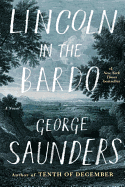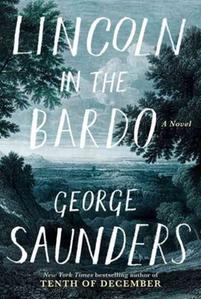
 Many admirers of George Saunders's inimitable short story collections like Tenth of December probably have despaired of this supremely talented, empathetic writer ever producing a novel. But with the publication of Lincoln in the Bardo, the wait is over, and we have a story of loss and grief that's extraordinary in both substance and style.
Many admirers of George Saunders's inimitable short story collections like Tenth of December probably have despaired of this supremely talented, empathetic writer ever producing a novel. But with the publication of Lincoln in the Bardo, the wait is over, and we have a story of loss and grief that's extraordinary in both substance and style.
The "bardo" is, in Tibetan Buddhism, the transitional state between death and rebirth. In Saunders's novel, it has a tangible location: Oak Hill Cemetery in Washington, D.C.'s Georgetown neighborhood, February 1862, shortly after the death of Abraham Lincoln's son Willie, age 11, from typhoid fever.
Over the course of an extended evening, the novel recounts the anguished visits of the grief-stricken president to the mausoleum containing his son's body. These rendezvous occur in anything but solitude. Instead, they're intently observed by an audience of spirits, whose alternating chorus of voices supplies most of the novel's distinctive, drama-style narrative as they recognize, in the words of one of them, the "vivifying effect this visitation had on our community."
As the ghosts emerge from their "sick-boxes" at nightfall, Saunders spins a fantastic story that includes scenes both gorgeous and tragic, all of them compelling. In one, an assemblage of angels ("young girls in summer dresses, brown-skinned and jolly, hair unbound, weaving strands of grass into bracelets, giggling as they passed: country girls, joyful and gay") urge the spirits, many stubbornly resisting, on to the next stage of eternity. In another, the author unfurls a spectacular vision of divine judgment, distinguishing it from the existence of souls who were "bored, so very bored, so continually bored," as each night for them "passed with a devastating sameness." That's one criticism that can't be leveled at Saunders's vibrant depictions of the often unruly, sometimes comical activities that occur in the raucous graveyard, as the ghosts, most of whom are unaware of their spiritual status, endlessly squabble and scheme.
And as if the premature death of his son weren't enough, the Lincoln of Saunders's novel, still in the first year of his presidency, must endure virulent attacks on his fitness for office. In stark contrast to the descriptions of the phantasmagoric events at Oak Hill are the chapters containing fragments of contemporary and historical writing about Lincoln. These clippings--some real and some convincingly invented--reveal the vilification the 16th president endured for his conduct during the war that was more than a year away from turning in the Union's favor.
George Saunders's Lincoln in the Bardo unquestionably requires a willing suspension of disbelief. Once accomplished, it's easy and most rewarding to surrender to the spellbinding power of this captivating novel. --Harvey Freedenberg, attorney and freelance reviewer
Shelf Talker: From the death of Abraham Lincoln's son, George Saunders's first novel spins a gloriously imaginative portrait of human grief and the afterlife.

